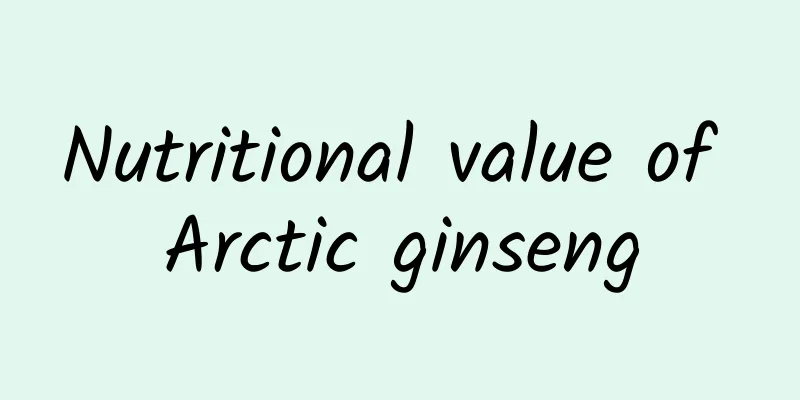Nutritional value of Arctic ginseng

|
Everyone knows that both ginseng and sea cucumber have very high nutritional value. The main difference between the two is that ginseng is a herbaceous plant that grows on the mainland, while sea cucumber is an animal that grows in the sea. The Arctic cucumber is a very precious sea cucumber. It mainly grows in the Atlantic Ocean in the world, and its production has been decreasing in recent years. But what are the nutritional values of Arctic ginseng? protein Arctic sea cucumbers contain 18 kinds of amino acids, among which the content of 10 essential amino acids for the human body is very high, especially arginine, which is much higher than other seafood. Arginine is an important component of male sperm cells and the raw material for synthesizing human collagen. It can promote cell regeneration and repair after body damage, and can also enhance the immune activity of lymphocytes, enhance human immunity, and prolong life. This coincides with the theory of "tonifying the kidney and replenishing essence" in traditional Chinese medicine. Arctic sea cucumber protein is mainly composed of collagen, and its effect is better than the traditional Chinese medicine glue supplements such as donkey-hide gelatin, tortoise shell glue and deer antler glue. The glycine and alkaline amino acids rich in this collagen are the material basis for blood production, blood nourishment (biosynthesis of hemoglobin and globin) and promotion of calcium absorption. Arctic sea cucumbers contain a pentapeptide composed of leucine, proline, serine, and arginine (some of which are in D-configuration), which has anti-tumor and anti-inflammatory activities. Another glycoprotein was identified that could inhibit the growth of animal transplanted tumors through immune-mediated inhibition. Sea cucumber extract Arctic sea cucumbers have a low environmental temperature and a long growth period, and are rich in holothurin, also known as sea cucumber saponin. Arctic sea cucumbers contain four forms, among which holothurin I is the most abundant. Its medical effects are: 1. Anti-tumor: Sea cucumber extract shows cytotoxic effects on experimental tumor cells (including human tumor strains). Some sea cucumber extracts that have been solvent-free to remove the sulfate groups on the oligosaccharide chains are more active than the prototype saponins. 2. Antibacterial effect: inhibit the growth of pathogenic bacteria (Geyang, Geyin) and pathogenic fungi (Trichophyton, Mucor, Candida, Aspergillus and Trichomonas), among which the fungicidal effect of sea cucumber I is particularly prominent; 3. Immunomodulation and hematopoietic function: Sea cucumber extract has immunomodulatory effects and synergistic immune activity of vaccines, while stimulating the growth of bone marrow red blood cells; 4. Promote sexual function: It has hormone-like activity, inhibits ovulation and stimulates uterine contractions; 5. Block neuromuscular conduction: It is used to prevent cerebral palsy and spasms caused by concussion and spinal injury; 6. Anti-fatigue effect. The polysaccharide content in the dry matter of Arctic sea cucumbers is about 15%, mainly mucopolysaccharides and sea cucumber glycosaminoglycans. In addition, the sulfated oligosaccharides it contains are unique to sea cucumbers and are of better quality than the polycationic components of deer antlers and high-quality shark fins. The function is similar to that of bird's nest, which is recommended by Chinese medicine for replenishing qi, strengthening the middle and curing deficiency, and chicken's gizzard lining, which is recommended for eliminating accumulation and strengthening the spleen. The main effects of sea cucumber polysaccharides are as follows: 1. Anti-cancer and cancer prevention: Sea cucumber mucopolysaccharides can resist the growth of tumors in various experimental animals, and the growth inhibition rates of MA-737 breast cancer and T795 lung cancer are as high as 79% and over 60% respectively. At the same time, it can also inhibit the artificial lung metastasis of M737 breast cancer and the natural metastasis of Lewis lung cancer. 2. Enhance immunity: Sea cucumber polysaccharides can improve the body's cellular immune function, improve and enhance the low immune function of animals caused by tumors or the use of anti-cancer drugs ; 3. Anti-thrombosis and hypoglycemic: Sea cucumber polysaccharides can inhibit the formation of blood clots and improve the survival rate of animals. The sea cucumber mucopolysaccharide was tested in normal middle-aged and elderly people (48-72 years old) and found to have the effect of reducing blood viscosity and plasma viscosity. It also showed the function of regulating blood lipids, i.e., reducing serum cholesterol and triglyceride levels, increasing apolipoprotein A and decreasing apolipoprotein B. 4. Delaying aging: In the experiment of rat cortical neurons cultured outside the sea cucumber mucopolysaccharide carrier, it has a significant effect on the damage or apoptosis of cortical neurons induced by amyloid β-protein. This type of polysaccharide has the effect of preventing central neuron degeneration, such as Alzheimer's disease; 5. Anti-virus: Sea cucumber mucopolysaccharides can fight against the specific lesions of tissue culture cells caused by herpes simplex virus (HSV); sea cucumber glycosaminoglycans can significantly inhibit the infection rate of AIDS (HIV) to cultured cells; in addition, preliminary clinical trials have confirmed that sea cucumber mucopolysaccharides are more effective than conventional drugs in converting the three positives of chronic hepatitis patients, namely Hb-sAg, HbeAg and anti-HBc, to negative and restoring liver function. 6. Anti-radiation: It has a protective effect on animals irradiated by C(60)O and promotes the recovery of their hematopoietic function; 7. Sea cucumber polysaccharides can prevent osteoporosis and can be used to treat arthritis. Fat, vitamins, minerals Although Arctic sea cucumbers have little fat, they contain essential fatty acids for the human body, arachidonic acid and EPA, which account for more than 50% of the total. Sea cucumbers mainly contain vitamins A, B, D, and E. Sea cucumbers contain a large amount of mineral nutrients, such as calcium, magnesium, manganese, and silicon. They are rich in organic calcium and are a natural calcium supplement. |
<<: Nutritional value of cultivated ginseng
>>: What are the effects of Panax notoginseng powder
Recommend
You loved to wander when you were a kid, but you stayed still when you grew up. I didn’t expect you to be two completely different people…
Barnacles have very hard shells, usually appear i...
How to identify the authenticity of American ginseng
American ginseng may be the best choice for nouri...
New energy vehicles: Let cars break up with gasoline?
As an important means of production and transport...
The efficacy, effects and contraindications of Fritillaria thunbergii
Fritillaria thunbergii is the most common Chinese...
If you always have cold legs and feet, be careful that your blood vessels are blocked! Here is a method to teach you how to identify blood clots!
In winter, your feet feel like ice cubes. Many pe...
#千万IP创科普# Prevent recurrence during season change, beware of these "dangerous minefields"|World Psoriasis Day
10.29 World Psoriasis Day As the autumn wind blow...
How to break through the boundaries of electricity application in the construction of space solar power stations?
What is a space solar power station? Why do we ne...
No extra steps required, just stick it on and it will charge
Produced by: Science Popularization China Author:...
Beware! If you see these bugs recently, don’t take photos!
This article was reviewed by Zhang Qikai, Chinese...
Don't argue, don't argue, all beers are equal
In a few days, the May Day holiday will come. Man...
Why do airplanes fly? The secret lies in their wings
"It's so fast that it's about to fly...
The efficacy of lemongrass water bath
Citronella is a common herb in our daily life. So...
Is it good to soak astragalus, codonopsis and red dates in water?
Astragalus is a commonly seen medicinal material,...
Was the disappeared ice field "giant horned monster" already picked up by a prehistoric cave "artist"?
In December 1994, French explorer Jean-Marin Chau...
The latest research confirms: The higher the children's education, the longer their parents live
Since ancient times, people have been striving fo...









